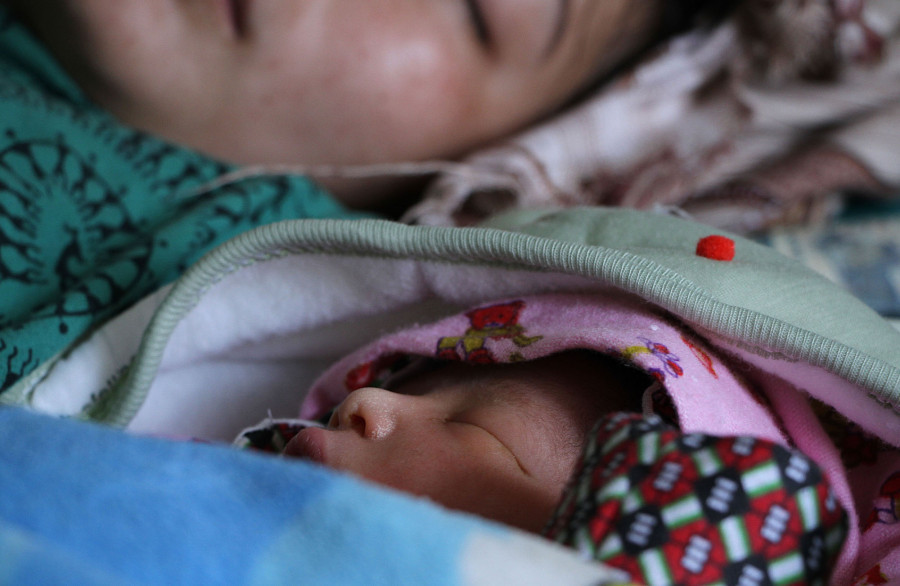Health
Reproductive health gains at risk as 85 pregnant women die due to lack of care in last five months
Maternal mortality was down 76 percent and stillbirth down by 56 percent in Nepal since 2000, according to a study.
Aditi Aryal
Last week, Sabina Thapa, a 23-year-old woman in her eighth month of pregnancy, died in Biratnagar after six hospitals refused to admit her. The previous evening, Thapa had slipped and fell down in her bathroom. Her health had deteriorated sharply within 24 hours and on Wednesday her family took her to Nobel Hospital immediately where she was refused admission.
Her family tried five more hospitals, including Birat Medical College, Birat Nursing Home, Koshi, Green Cross and Suraksha Hospitals. All of them refused admission.
“My sister-in-law wanted to save her child so begged the hospitals to take her in but they were merciless. A nurse at Koshi Hospital even took the chair away from her when she was about to sit on it,” Binita Darji told the Post. “Some hospitals refused to admit her claiming insufficient beds and ventilators while some said they weren’t taking in new patients due to Covid-19.”
Thapa died en route to B.P Koirala Institute of Health Sciences in Dharan.
“The nurses at Dharan hospital told us that she died of weakness and her oxygen level was low. She tested negative for coronavirus. Had we brought her thirty minutes earlier, she would have been alive today,” Darji told the Post
Thapa’s death is a reminder how maternal health has been impacted in Nepal during the pandemic. In May, maternal mortality was reported to have increased by 200 percent after the lockdown was imposed in March.
In the last five months, 85 pregnant women have died in Nepal mostly because of inability to reach hospital in time, deliveries taking place at home, complications during birth and anxiety over Covid-19, according to Dr. Punya Poudel, chief of the Safe Motherhood Unit at the Family Welfare Division of the Ministry of Health and Population.
In the whole of the 2018-19 fiscal year, 80 pregnant women had died.
A study conducted in nine hospitals in all seven provinces between January and May this year found that in the twelve and half weeks prior to the lockdown 13,189 women gave birth in hospitals before the lockdown but this number came down to 7,165 in the nine and half weeks of lockdown.
Published in August in Lancet, a leading public health journal, the study said since 2000, maternal mortality in Nepal has decreased by 76 percent, and stillbirth by 58 percent. The number of institutional births increased four times between 2001 and 2016.
According to Aruna Karki, a gynaecologist and reproductive health expert, the pandemic has resulted in difficulties for women seeking reproductive healthcare.
Post lockdown, the number of women visiting hospitals has subsequently declined as restrictions in movement, fear of contracting Covid-19, and absence of transport have hindered access to maternal health care.
“I find pregnant women and new mothers to be in a state of anxiety,” Karki told the Post. “Since we’re in the middle of a pandemic, they’re not able to avail adequate healthcare and are living in the fear of dying.”
The costs of providing and seeking healthcare has also increased. “We need to get the expectant mothers tested for Covid-19, without which all the patients and hospital staff are at a risk. We also need to procure protective equipment.”
An additional burden of the cost of equipment and testing is put on the patients. “In the present situation, when the government cannot afford equipment and testing, neither can we,” said Karki.
Deceased Thapa, too, according to Darji, could visit a health post only once during the entire course of her pregnancy. The nearest health post was only an hour away but fearing infections health workers there had asked them to stop coming.
Health workers in rural Nepal who work with pregnant women also said fewer pregnant women visited them, due to lack of means of transport or anxiety over contracting Covid-19.
“Most women have stopped coming to the health centres for their regular check-ups,” Shobha Rijal, a nurse at a birthing center in Panchthar, told the Post. “They’re either too scared of getting infected or do not have the means of transport to get here. If a few Covid-19 positive cases are detected, the local government makes rules arbitrarily, and this affects mobility of all vehicles including ambulances.”
Despite being referred to hospitals in cases of extreme emergencies, many women have not been able to get there even in ambulances and in some instances ambulances never showed up and in others hospitals have refused to admit them, according to Rijal.
As a result, Rijal claims, that the number of births at home without medical supervision have increased, which can lead to more deaths among mothers and newly born babies.
Aside from prenatal and postnatal care, the pandemic has also lowered access to birth control and family planning, other facets of reproductive health. According to UNFPA, family planning is essential in reducing maternal mortality.
R., a female of 28 years, has been on birth control for 10 years but has kept it a secret from her husband. The Post is identifying her only by the first initial in the interest of privacy.
When the couple had their first child, they were both 16. With no regular income, the child was an enormous financial burden to the couple. At 18, R. implanted an etonogestrel birth control inside the skin of her upper arm.
“My husband refuses to use any form of birth control because he is adamant on having more children,” R. told the Post. “So I had to do it discreetly.”
The time has come for her to replace it, which is done every five years, but she has not been able to because of the pandemic.
“When the lockdown was lifted briefly, I was too scared to go out, especially to a health center which is frequented by many sick people. Now that my husband is at home all the time, it is difficult to trick him and leave the house for a long time.”
R. is now scared she may get pregnant, and a new baby is not something she is looking forward to at the moment. “At 16, my husband and I were too shy to buy contraceptives and I got pregnant. Now, I can get birth control but I could still become pregnant. I don’t even know what happens if I don’t get it replaced soon,” she said.
According to Satyajit Pradhan, a director at Marie Stopes, an organisation that specialises in providing contraceptives, safe abortion and family planning services across Nepal through 30 centers, providing some services has been difficult due to the pandemic.
“When the lockdown was first imposed, for a few weeks we could not provide any service including regular check-ups or cervical cancer screenings since matters related to reproductive health are not considered an essential service. After lobbying with the government, we could finally get our service centers to open,” Pradhan told the Post. “However, reaching these centres was still a huge challenge for both service providers and patients.”
Poudel of the Health Ministry, does not agree that the situation is as dire as it is made out to be.
“In the first two weeks of the lockdown, reproductive health services were reduced by about half, but after the Health Ministry initiated training, orientations, and established a hotline, hospitals began operating as usual,” Paudel said. “Paropakar Maternity and Women’s Hospital in Kathmandu is full. If anything, there is a shortage of medical personnel but no decline in the number of patients.”
In June, Poudel had told the Post that due to the fear of getting infected with the virus, women were avoiding institutional delivery and antenatal visits .
However, according to Karki, the reproductive health expert, it is not only the hospitals that have stopped providing services but it is also that access for women across the nation to the hospitals that has been compromised by the pandemic.
That is little solace for family members of the deceased.
“What happened to our family is a preventable tragedy but neither the hospitals nor the government will take any responsibility for their actions,” Darji told the Post. “All we wanted was a healthy child in our family, but right now we’re grieving for two lives. I only pray that nobody else in the country has to go through this immeasurable pain.”




 22°C Kathmandu
22°C Kathmandu














